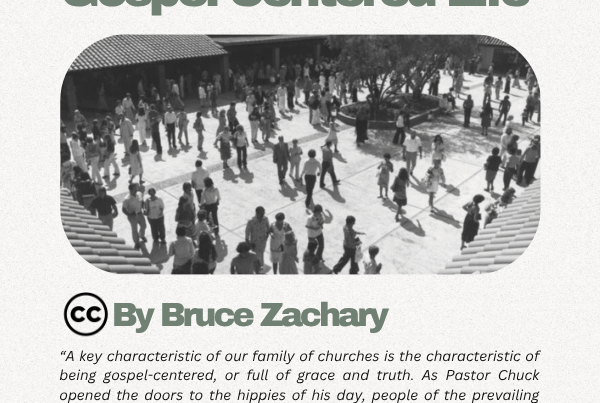
One of the values of our local church is “We create margin for what matters most.” We have observed, discovered, and experienced that life is too complicated. As individuals, as families, as groups, and as a community of faith, we need to create margin for what matters most. How can you cultivate new rhythms that help you to flourish in community and grow healthier—spiritually, emotionally, and even physically?
1. What are the priorities?
First, we need to determine what matters most. Presumably, Jesus would not leave us without direction, guidance, and important clues to figure out what are the priorities. We presume the great commandments to love God supremely and love your neighbor as yourself provide valuable insight.
When Jesus was asked the greatest commandment, He responded by quoting Deuteronomy 6:5: “You shall love the Lord your God with all your heart, with all your soul, and with all your strength.” Jesus’ Jewish audience would associate this verse within the premier prayer of Judaism, the Sh’ma. Israel is exhorted to “Hear” (Sh’ma), that is, to listen, understand, and apply God’s truth and wisdom. Israel is reminded that there is no other God besides YHWH, and they are in a sacred covenant relationship: “Hear, O Israel: The Lord our God, the Lord is one!” Then, what follows is the instruction that God’s commands are to be observed in the home, taught to your children, and observed when you leave the home. Thus, we could conclude the first priority is God and the second is family. Note, God has to be first because you cannot properly love your family or others without receiving and responding to God’s love.
Imagine the many spheres of life that people are trying to juggle: personal health, recreation, school, career, friends, family, God, etc. As you juggle those spheres, keep in mind that most of them are “rubber” in the sense that if you drop them, the consequences are manageable. On the other hand, the marriage and family spheres are like “glass,” so you don’t want to drop them. Making God the priority will allow you to balance and maintain the other spheres properly without damaging them.
Jesus helped us to discover the third priority when He volunteered the second greatest commandment: “And you will love your neighbor as you love yourself’ (Lev. 19:18). The second great command was like the first in that they cannot be separated. Not only do you need to love God to properly love others, but your love for neighbors is evidence that you truly love God. Therefore, the third priority is to love neighbors. We must remember that Jesus made clear that a neighbor is often someone that you have little in common with including religious beliefs, and affinity (Luke 10:30-37). They are people God has called you to share His love with where you live, work, study, play, and worship. Thus, we could say neighbors include friends and those whom God brings into your sphere of influence. The priorities arewho matters most: God, family, and neighbors.
2. Discover discretionary time and create margin.
Each of us has 168 hours in a week. Very few people are fully free or independent in the sense that they have no time-consuming responsibilities or commitments. The largest commitments of time are often related to parenting, being a student, work, and sleep. Anecdotally, life seems very busy and complicated. There does not seem to be a healthy margin, and where there is margin, we often neglect what matters most.
Take a week or month to consider how you use your time. Consider entering in a calendar your actual use of time to see the patterns and rhythms that emerge. Discover how you use time before work or school, after work or school, and on your days off. What time do you generally wake-up, and what time do you generally go to sleep?
The greater the margin, the greater your freedom to enjoy what matters most to God. Paul exhorted the Corinthians not to worry about being a servant (cf. employee), but if they gained freedom to use it: “Were you called while a slave? Do not be concerned about it; but if you can be made free, rather use it” (1 Corinthians 7:21). In an effort to gain freedom, you can discover discretionary time and create margin. I would recommend adjusting the pendulum intentionally, but gradually, to avoid unintended consequences. For example, in most instances the answer is not to quit your job, or stop all recreational activities to create margin. If you are married or have a family, there should be a team approach to decisions. What changes need to be made to free-up time? Begin by identifying changes that create margin of a few hours every day or week.
3. Discern how God would have you redeem the time.
Prayerfully seek to discern how God would have you reallocate time. Consider spiritual disciplines to enhance your relationship with God. These might include, but not be limited to: Bible learning, prayer, contemplation and reflection (e.g., journaling), weekend worship gatherings, service in a local-church or para-church ministry, fasting, or generosity.
Consider relational disciplines to enhance your relationships with spouse, family, friends, and neighbors. These might include, but not be limited to: date nights, family devotional and/or prayer, family meals, weekly time spent with friends and neighbors talking, sharing a meal, or recreation.
Consider personal disciplines to enhance your health. Consider sleep, diet, exercise, content consumption, alcohol, drugs, or recreation.
Cultivate new rhythms resulting in new habits. Our habits, good or bad, can generally be established or broken in about a month. You are engaging in time-leadership more than management. Schedule new practices for what matters most and zealously protect that time from intrusion. Learn to say “No” to non-critical encroachers. Evaluate at the end of a month or two (or three). If you need to adjust the rhythms, try something new.
In addition, create some margin generally to provide flexibility for divine appointments. Create margin to talk, to listen, to pray, to observe, to hug, and to spontaneously play. Learn to recognize God’s leading of how to use that margin on any given occasion. Passionately protect margin, because in the margin is where you discover and enjoy what matters most.










